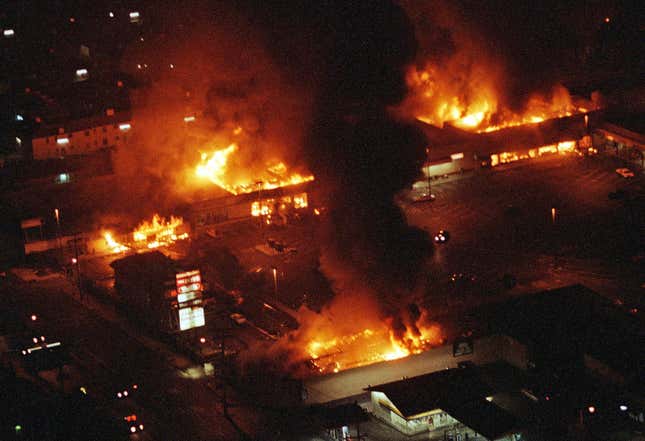
On April 29, 1992, the four white Los Angeles police officers who beat Black motorist Rodney King within an inch of his life a year earlier, were acquitted in a court of law on almost all charges (one of which included felony assault). The only things Theodore Briseno and Timothy Wind lost were their jobs in law enforcement; Stacey Koon and Laurence Powell were sentenced to two and a half years in prison for violating King’s rights by use of unreasonable force.
The lack of repercussions for the officers involved despite the incident being caught on camera only proved to the world what we already knew: cops are death sentences for Black people. Although King survived the beating and eventually won a lawsuit two years later against the City of Los Angeles (he passed away in 2012), there was nothing that could stop L.A. residents from taking to the streets the day the verdict was announced. The protests would last for 5 days.
South Los Angeles—which was predominantly Black—had continually been plagued by racial and economic equality. Unemployment was already at 50 percent and communities being ravaged by a drug epidemic as well as gang culture. Black people were also being disproportionately harassed, arrested and assaulted by police. A month before King’s beating, 15-year-old Latasha Harlins—who was Black—was murdered by a Korean store owner who believed she was stealing from his store.
In reality, she was just reaching in her pocket to pay for her purchase. The owner’s only punishment was probation and a $500 fine. It was ultimately the Rodney King verdict that pushed protestors over the edge. The L.A. Riots were inevitable; Black people were reminded on a daily basis that our lives were disposable. Despite King famously asking the question “Can we all just get along?” just days after the unrest began, his pleas for peace could never erase the fact that violence inflicted upon us by anyone—including those hired to “protect” us—will always be considered warranted.
That it could be caught on camera and the assailants would never be prosecuted. Thousands of fires burned during the L.A. Riots and property damage was estimated at nearly $1 billion. Ultimately, it was a cry by the city’s inhabitants who had no resources, no protection and absolutely nothing to lose. Three decades later, the tape of the King’s attack foreshadows how police brutality caught on film doesn’t mean justice for Black people. We would see it time and time again as Black people are the ones who are killed the most by police.
Though we comprise 13 percent of the population, we account for 27 percent of fatal police shootings. Officer Daniel Pantaleo wasn’t indicted after he killed Eric Garner on camera. Officer Jeronimo Yanez was acquitted after he killed Philando Castile on camera. Both legal outcomes sparked protest, but it was the 2020 murder of George Floyd—also caught on camera—by Officer Derek Chauvin that most closely mirrored the L.A. Riots.
Exacerabated by the devastation of Covid-19, Floyd’s death sparked the largest series of racial justice protests in the US since the civil rights movement. Like the L.A. Riots, they also escalated to fires being set and looting taking place. Just like in 1992, Black people were being reminded that our lives are deemed worthless by law enforcement. And just like in 1992, we had nothing to lose.
As the world reflects on the 30 year anniversary of the Rodney King verdict—and the subsequent protests it caused—it’s vital to remember a somber truth when it comes to being Black in America. No matter how much institutions and systems claim to “improve” Black plight, the more things change, the more they stay the same.

